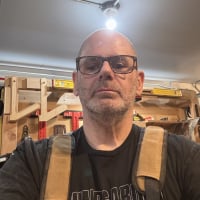Welcome! Here are the website rules, as well as some tips for using this forum.
Need to contact us? Visit https://heatinghelp.com/contact-us/.
Click here to Find a Contractor in your area.
If our community has helped you, please consider making a contribution to support this website. Thanks!
PONPC with primary secondary piping
Options

dobro23
Member Posts: 72
Hey guys just asking for your opinions on where the expansion tank and feeder should be located on a wall hung condensing boiler such as a Navien Combi or NHB etc. Most piping diagrams show the air separator, tank, and feed on the primary loop supply header just prior to the zoning. Just wondering if it would be equally effective on the boiler loop? (secondary loop) For example, between the boiler supply tapping and the branch of the primary/secondary tees. As long as i have valves properly set up for purging etc I can't see that it would make too much of a difference. Maybe the piping diagrams are drawn that way for ease of explanation or installation? what do you guys think? Am I missing something?
0
Comments
-
take this light heartedly, I'm not trying to offend.
So you read the manuals, participate here, have seen the disasters, and you still want to go RE ENGINEERING this? why ? (all the rest of the emojies)
why ? (all the rest of the emojies)
The PONPC on the primary loop makes the primary the PONPC for all the secondaries / zones / boiler injector(s),
or, cause, Dan says so(?), (all of the emojies)
pretty sure I know this from Pumping Away, and all the hydronic manufacturers.
known to beat dead horses0 -
not offended at all Neil and i appreciate the insight. just trying to understand. Again, not sure if the manuals are saying this for ease of illustration etc. In my situation of question, the HOUSE is the primary and the BOILER is the secondary.0
-
I like to look at it as system loop and boiler loop. @neilc is correct. Siggy says it. Dan says it. Manufactuers say it and it makes perfect sense.Steve Minnich0
-
May be so, but I don't see any particular reason you couldn't. As long as everythi ng is going away from the ponpc, why not.
Sorry, I am a "I don't care what so and so said" kind of guy, and am more of a "why" kind of guy. I like to know why, and in this case, just because it is different, what is the issue?
Rick0 -
-
There are a number of ways to pipe primary secondary, here are some examples. I included my suggestion for the expansion tank connection.
With hydro-sept there are a number of connection points for the exp tank that are acceptable.
Often piping arrangements that are claimed to be primary secondary are not
If it doesn't involve closely spaced tees, a hydro separator or properly piped buffer, it is not a true P/S, in my mind.
Bob "hot rod" Rohr
trainer for Caleffi NA
Living the hydronic dream0 -
@dobro23 - I've gone to using hydraulic separators on almost every job. It's a no brainer for me especially when I'm using multiple boilers. They work great, serve multiple purposes, and clean up the near boiler piping. Forget about the cost difference. When customers see the work you do, your attention to detail, how well the systems work, and how professional your piping is; you'll make that up with all the referrals you're going to get.
Our industry's history has been pretty interesting. These concepts - P/S piping, low loss headers (hyd. seps.), pumping away, and others; have been around forever. It's taken some really smart people (manufacturers, writers) to bring them back.Steve Minnich0
Categories
- All Categories
- 87.3K THE MAIN WALL
- 3.2K A-C, Heat Pumps & Refrigeration
- 61 Biomass
- 429 Carbon Monoxide Awareness
- 120 Chimneys & Flues
- 2.1K Domestic Hot Water
- 5.8K Gas Heating
- 114 Geothermal
- 166 Indoor-Air Quality
- 3.7K Oil Heating
- 77 Pipe Deterioration
- 1K Plumbing
- 6.5K Radiant Heating
- 395 Solar
- 15.7K Strictly Steam
- 3.4K Thermostats and Controls
- 56 Water Quality
- 51 Industry Classes
- 50 Job Opportunities
- 18 Recall Announcements

